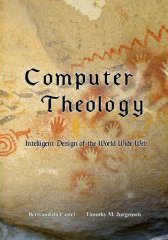PRESS
COMPUTER THEOLOGY |
||||
Trust in the Real World
Money is built
on trust. If I don’t believe that I can get some new goods in exchange for the
piece of paper that you give me in exchange for my services, then I will
probably choose not to work for you. While societies have made some peace with
such paper, thanks in a large part to governments attempting to establish trust
in currency with all the force of law, its limitations led to new forms of
commerce. The new forms faced new trust issues as well, in many cases because
they were born of private initiatives. In Chapter 6, we reprised the anecdote
of The First Supper. The credit card associations have subsequently provided a
variant of currency that drives commerce in general, and commerce on the Web
specifically. It is interesting to note that the most recent television
commercials for credit cards actually disparage the use of actual cash because
it makes a transaction too slow. But, such was not always the case. In the early
days, while local credit card use could keep trust in the new form of money
under control, it was immediately clear to both clients and merchants that
fraud could very easily affect them. A thief duplicating a card and using it to
make a purchase would result in a situation where the merchant would eventually
ask the wrong person for payment. Depending on settlement modalities, this
situation would directly affect the client, the merchant or both. Clearly, the
banks issuing the cards needed to solve the problem, which they did by offering
various guarantees of compensation to both clients and merchants in cases of
fraud. That moved the liability for fraudulent transactions into the banking
camp, which was then confronted with mounting fraud. This rather naturally
followed from the precept that unanswered fraud leads to more of the same. That’s
where the In the As the volume of
payments by credit card increased, manual verification of transactions became
impossible and therefore computers were brought to the party. The first thing
that a computer can do very effectively is to check the card data against a revocation
list that contains information about cards stolen or otherwise invalid.
That’s why we are asked to report a lost credit card rapidly; the card issuer
can enter that information in the database, and subsequent checks will return a
warning. In the |
||||
|
||||
© Midori Press, LLC, 2008. All rights reserved for all countries. (Inquiries) The contents of ComputerTheology: Intelligent Design of the World Wide Web are presented for the sole purpose of on-line reading to allow the reader to determine whether to purchase the book. Reproduction and other derivative works are expressly forbidden without the written consent of Midori Press. Legal deposit with the US Library of Congress 1-33735636, 2007.
|
ComputerTheology Intelligent Design of the World Wide Web Bertrand du Castel and Timothy M. Jurgensen Midori Press, Austin Texas 1st Edition 2008 (468 pp) ISBN 0-9801821-1-5 |
Book available at Midori Press (regular) |
